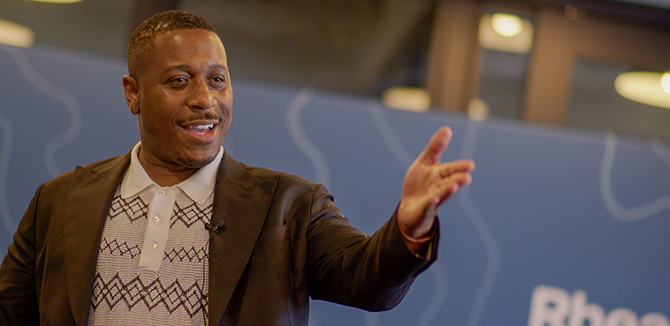From the Research Lab to CEO
New Industry Advisory Board Member Garry Cooper shares the Northwestern roots of his company Rheaply and why he’s excited to be a part of the mpd² program.

In an often-forgotten room in the bowels of many businesses lies a graveyard of unused office furniture, fixtures, and equipment.
Garry Cooper is trying to change that.
More precisely, Cooper is trying to keep those unwanted goods out of the landfill and give them new life with an organization or charity in need of exactly what is merely collecting cobwebs.
Cooper is the CEO and co-founder of Rheaply, a climate technology company working to scale the reuse economy to reduce waste, cost, and carbon emissions. He also is a new member of the Industry Advisory Board (IAB) of Northwestern Engineering's Master of Product Design and Development Management (mpd²) program.
Cooper said he believes his company plays a vital role in the marketplace by offering a platform that uses advanced technology to match those with excess with those in need.
“The climate crisis is arguably the biggest crisis we face today. It impacts everything, from what we eat to how we manufacture,” he said. “We get to build something brand new to address this crisis, to help organizations digitize their physical footprint and reuse as much as possible while driving waste reduction and cost and carbon savings.”
The name Rheaply is a combination of the words “Research” and “Cheaply” and hints at the origins of the company.
Cooper was a PhD student at Northwestern University’s Feinberg School of Medicine back in 2014 and feeling troubled. He looked around at university research departments across the country and saw how they were underfunded yet had literal tons of unused equipment.
“How could waste be so rampant for the same items people needed so badly to conduct their research?” Cooper said. “So I persuaded the managers of my neuroscience faculty to collect labware, instruments, shelving, and other stuff that wasn’t being used. I then loaded it onto a cart and distributed it to other departments that needed the equipment. This cart service became a regular Friday afternoon ritual.”
Years later, Cooper still received emails about his cart initiative. So he asked himself: “What could a resource and material recovery platform look like that would allow users to better visualize, quantify, and use surplus resources?
Thus, Rheaply was born.
Today, Rheaply is moving beyond the lab, establishing itself as a climate tech company on a mission to bring circularity to every business. Founded in Chicago in 2016, Rheaply’s platform combines inventory management and digital marketplaces with sustainability solutions so that organizations can keep valuable products and materials in use, reduce costs and waste, and reach their sustainability goals. Through sharing, reusing, repurposing, selling or donating, Rheaply’s ecosystem creates pathways into the circular economy so that every resource can find its next use.
Cooper sees his company as a lynchpin in a movement to help businesses think more responsibly about their physical footprint and assist community organizations and charities by giving their unused furniture, fixtures, and equipment a chance to once again see the light of day.
He said he is proud to be surrounded by a talented group of employees who share the passion for the mission.
“We must emulate the reuse heroes in businesses that do not allow valuable resources to go to waste,” he said. “Maybe that is someone that refuses to decommission an office closing down without first determining the needs of the community. This passion I refer to is the collective thinking innovatively about the next, best, and highest use for physical resources.”
Another important resource Cooper sees is the talent coming from the mpd² program. That’s why Cooper jumped at the chance to join its Industry Advisory Board, which is tasked with ensuring the curriculum remains aligned with real business needs.
He said he anticipates the learning to go both ways.
“I’m eager to learn from budding stars who are paving the path for the future of climate tech driven by product design and development,” he said. “I hope at the very least I can extend some of my learnings from my time building Rheaply in one of the fastest growing fields in climate tech and share influential advice, especially as it pertains to end-user research and development of a startup ecosystem.”
